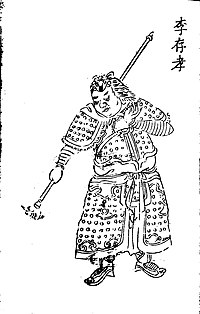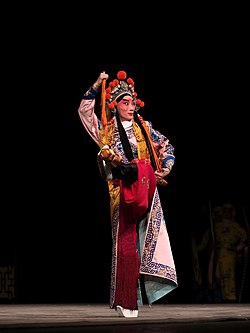Li Cunxiao

Li Cunxiao(Lý tồn hiếu) (d. 894), néAn Jingsi(An kính tư), was an adoptive son of the late-Tang dynastywarlordLi Keyongwho contributed much to Li Keyong's campaigns, but who later rebelled against his adoptive father. He subsequently was defeated by Li Keyong and executed bydismembermentafter he surrendered, although Li Keyong soon regretted his death.
Background
[edit]It is not known when An Jingsi was born, but it is known that he, or his family, was originally from Feihu ( phi hồ, in modernZhangjiakou,Hebei). He was taken captive byLi Keyongduring one of Li Keyong's raids in the region, and Li Keyong raised him as an adoptive son, changing his name to Li Cunxiao. He thereafter became a cavalry officer in Li Keyong's army.[1]It was said that after he grew up, he was capable in horsemanship and archery, and no officer in Li Keyong's army rivaled him in ferocity. He often served as Li Keyong's forward commander, and during Li Keyong's campaigns against the agrarian rebelHuang Chao,he served with distinction.[2]
Campaigns under Li Keyong
[edit]In 888, whenZhang Quanyithe mayor of Henan Municipality ( Hà Nam, i.e., theLuoyangregion) turned against his allyLi Hanzhithe military governor of Heyang Circuit ( Hà Dương, headquartered in modernJiaozuo,Henan) and captured Heyang Circuit's capital Heyang, Li Hanzhi sought aid from Li Keyong. Li Keyong hadKang Junlicommand Li Cunxiao and four other officers (Xue Atan (Tiết a đàn), Shi Yan (Sử nghiễm), An Quanjun (An toàn tuấn), and An Xiuxiu (An hưu hưu )) in aiding Li Hanzhi to put Heyang under siege. However, Li Keyong's major rivalZhu Quanzhongthe military governor of Xuanwu Circuit ( tuyên võ, headquartered in modernKaifeng,Henan) sent his officersDing Hui,Ge Congzhou,and Niu Cunjie (Ngưu tồn tiết) to aid Zhang. The Xuanwu forces defeated the Hedong forces, causing An Xiuxiu to desert the army in fear of being punished. When the Xuanwu forces then threatened to cut off the Hedong forces' path back to Hedong, Kang withdrew, leaving Zhang in control of Heyang Circuit.[3]
In 889, Li Keyong sent Li Hanzhi (who by that point was serving under Li Keyong) and Li Cunxiao to attackMeng Fangli,who then controlled the eastern half of Zhaoyi Circuit (Chiêu nghĩa) with his headquarters at Xing Prefecture ( Hình Châu, in modernXingtai,Hebei). (Li Keyong's brother Li Kexiu (Lý khắc tu) controlled the western half, with its headquarters at Lu Prefecture ( Lộ Châu, in modernChangzhi,Shanxi).) Li Hanzhi and Li Cunxiao quickly captured the other two prefectures under Meng's control — Ci (Từ Châu) and Ming ( Minh Châu, both in modernHandan,Hebei), and then put Xing under siege. Meng committed suicide. His brother Meng Qian (Mạnh dời) subsequently surrendered Xing to Li Keyong, allowing Li Keyong to control Zhaoyi in its entirety.[4]
In 890, then-reigningEmperor Zhaozongdeclared a general campaign against Li Keyong, with thechancellorZhang Junin command. With Li Kexiu having died recently, another brother of Li Keyong's, Li Kegong (Lý khắc cung), was in command at Zhaoyi, but was soon assassinated. His officer Feng Ba (Phùng bá) took over Lu Prefecture and soon received aid in defending the city from Zhu's officer Ge Congzhou. Li Keyong sent Kang and Li Cunxiao to put Lu under siege. Meanwhile, the imperially-commissioned new military governor, Zhang's deputy Sun Kui (Tôn quỹ), was also heading to Lu to take command. Li Cunxiao, receiving this news, laid a trap for Sun near Lu and captured Sun, whom he delivered to Li Keyong and whom Li Keyong executed. Feng and Ge subsequently abandoned Lu, allowing Li Keyong to regain control of Zhaoyi. Li Keyong made Kang the acting military governor of Zhaoyi and Li Cunxiao the prefect of Fen Prefecture ( Phần Châu, in modernLinfen,Shanxi). (Li Cunxiao was displeased with this, as he believed that due to his accomplishment in capturing Sun, he should be given Zhaoyi. It was said that for several days he did not eat well and killed a number of people, and thereafter began to harbor thoughts of turning against Li Keyong.)[4]
In winter 890, Li Keyong sent Li Cunxiao to engage Zhang Jun. Zhang's allyHan Jiantried to ambush Li Cunxiao at night, but Li Cunxiao repelled his attack. After this failure, some of Zhang's army deserted him. Zhang and Han were forced to retreat to Jin Prefecture ( Tấn Châu, in modern Linfen) to defend it. Li Cunxiao initially put it under siege, but then, concluding that it was not a good idea to capture a chancellor and slaughter the imperial army, opened up one side of the siege to allow Zhang and Han to escape. Li Cunxiao thereafter captured Jin and Jiang ( dây châu, in modernYuncheng,Shanxi) Prefectures. With the imperial army defeated, Emperor Zhaozong was forced to abandon the campaign and seek peace with Li Keyong.[4]
In 891, An Zhi gian (An biết kiến), whom Li Keyong had commissioned as the military governor of Xingming Circuit ( Hình minh, i.e., formerly the eastern half of Zhaoyi), was secretly communicating with Zhu. When Li Keyong realized this, he commissioned Li Cunxiao to replace An. An, in fear, fled, and was killed in flight by Li Keyong's allyZhu Xuanthe military governor of Tianping Circuit ( thiên bình, headquartered in modernTai'an,Shandong).[4]
Later in 891, Li Cunxiao tried to persuade Li Keyong to launch a campaign to capture Chengde Circuit ( thành đức, headquartered in modernShijiazhuang,Hebei), then ruled byWang Rong.Li Keyong initially agreed.[4]However, Li Cunxiao's adoptive brotherLi Cunxin,a rival for Li Keyong's favor, then dissuaded Li Keyong from the plan. Thereafter, when Wang and his allyLi Kuangweithe military governor of Lulong Circuit ( Lư long, headquartered in modernBeijing) attacked Yaoshan ( Nghiêu sơn, in modern Xingtai) in spring 892, Li Keyong sent Li Cunxiao and Li Cunxin to try to lift the siege, but as Li Cunxiao and Li Cunxin despised each other, neither was willing to attack first, forcing Li Keyong to further send Li Sixun (Lý tự huân) to repel Wang's and Li Kuangwei's attack. After this event, Li Cunxin falsely accused Li Cunxiao of being in communications with Wang and Zhu. When Li Cunxiao heard this, in anger, he in fact entered into an alliance with Wang and Zhu, and further submitted a petition to Emperor Zhaozong, offering his domain to imperial control and further requesting to attack Li Keyong. Emperor Zhaozong commissioned Li Cunxiao as the military governor of Xingming Circuit, but forbade him from attacking Li Keyong.[5]
Rebellion against Li Keyong
[edit]In 893, when Li Keyong attacked Wang Rong, Li Cunxiao personally led his troops to aid Wang; however, Li Keyong's attack was not repelled until Li Kuangwei also came to Wang's aid and defeated Li Keyong, forcing him to withdraw.[5]
As of fall 893, Li Keyong's army had Li Cunxiao's capital Xing Prefecture under siege. Li Keyong had his soldiers dig ditches around Xing's walls, but Li Cunxiao disrupted the operation by frequently attacking the soldiers digging the ditches. The Hedong officer Yuan Fengtao (Viên phụng thao) then sent a secret message to Li Cunxiao, stating that Li Keyong would return to Hedong's capitalTaiyuanas soon as the ditches were complete and that Li Cunxiao should let the ditches be finished, as none of the other Hedong officers could stand up to him. Li Cunxiao, agreeing with Yuan, held off on attacking the ditch-digging soldiers. Soon thereafter, the ditches were complete, but to Li Cunxiao's surprise, the ditches were done so well that no one could cross them, and they trapped Li Cunxiao inside the city without aid.[5]
By spring 894, the food supply in Xing Prefecture had been exhausted. Li Cunxiao ascended the city walls and begged Li Keyong for mercy. Li Keyong sent his wifeLady Liuinside the city to check on Li Cunxiao, and she came out with him. Li Cunxiao again begged for mercy, stating that it was due to Li Cunxin's false accusations that he turned against Li Keyong. Li Keyong rebuked him for allying with Wang Rong and Zhu Quanzhong, and then took him back to Taiyuan and executed him by dismemberment. (Li Keyong had originally intended to release Li Cunxiao, and believed incorrectly that as Li Cunxiao was to be executed, other officers would beg on his behalf, and then he could release Li Cunxiao without losing face; instead, none of the other officers, who were all jealous of Li Cunxiao's ferocity, spoke on his behalf, so the execution was carried out.) Li Keyong was said to be so saddened by Li Cunxiao's death that he did not oversee matters of the military for a number of days. Soon thereafter, Xue Atan, who had been in secret communications with Li Cunxiao since the other officers were also jealous of him, committed suicide. It was said that Li Cunxiao's and Xue's deaths so weakened Li Keyong's army that he was not able to contend with Zhu thereafter.[5]
In fiction
[edit]
TheYuan dynastymaster playwrightGuan Hanqingwrote a play titled "A Grieving Lady Deng Painfully Laments Cunxiao" (Đặng phu nhân đau khổ khóc tồn hiếu), which was translated as "Death of the Winged-Tiger General" byYang Hsien-yiandGladys Yangin 1958.[6](Lady Deng was the name of Li Cunxiao's wife in the play.) According to the play, Li Cunxiao was extremely loyal to Li Keyong and never intended to rebel, but was falsely accused of that by the treacherous Li Cunxin and Kang Junli, who had him cruelly executed behind Li Keyong's back. InfluentialMing dynastynovelistLuo Guanzhong's classic novelRomance of the End of Tang and Five Dynasties Histories(Tàn đường năm đời sử diễn nghĩa) expanded on this account and exaggerated Li Cunxiao's heroic prowess. Several modern dramas were in turn based on these largely fictional stories and deviated even more from history, including:
- The Heroic Ones,a 1970 Hong Kong film starringDavid Chiangas Li Cunxiao
- General Stone,a 1976 Hong Kong film starringTan Tao-liangas Li Cunxiao
- The Wild Bunch,a 1982 Hong Kong TV series starringFelix Wongas Li Cunxiao
Notes and references
[edit]- ^New History of the Five Dynasties,vol. 36.
- ^History of the Five Dynasties,vol. 53.
- ^Zizhi Tong gian,vol. 257.
- ^abcdeZizhi Tong gian,vol. 258.
- ^abcdZizhi Tong gian,vol. 259.
- ^Yang, Gladys;Yang Hsien-yi(1958).Selected Plays of Kuan Han-ch'ing.New Art and Literature Publishing House.
